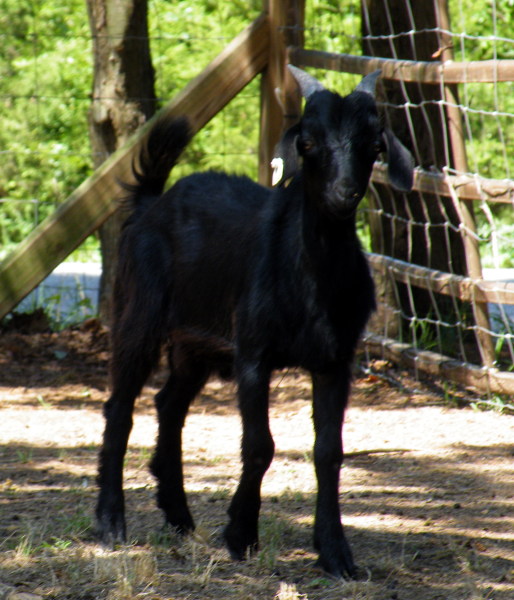"The Kiko goat was developed in the temperate climate of New Zealand in the late 1970’s. Feral does of this region possessed great hardiness as compared to many domestic breeds, and were screened to a small number that met selection criteria assigned for use in early development of the breed. The Kiko inherits its maternal and hardiness traits from these feral does. The feral does were hardy, but small in size, so dairy bucks were added to the herd to increase their size and milk production. After four generations of controlled and selective breeding, significant improvement in size and performance had been achieved, and the basis for the Kiko breed was established. Early selection criteria were based primarily on survivability and growth rates. The later selection parameters included rapid rate of growth, improved fertility, early maturity, enhanced nutritional availability for offspring, extended breeding season, and ease of maintenance. Animals with any type of foot problems were culled. Over the next several years, does were culled annually at approximately seventy-five percent. Buck kids were culled at ninety percent and again at 50% to retain only the top five percent of bucks for herd sires.
"There are no defined breed standards for Kiko goats as to size, conformation or color. Kiko breeders are encouraged to focus more on the commercially valuable traits. This is the reason there are no sanctioned Kiko goat shows. The dominant color of Kiko goats is white; however they can be any color. The Kiko goat is a performance based breed. The goal of every commercial meat goat producer should be to have as many pounds of kids as possible to load on the truck at market time." end quote
Kikos are a meat goat so although that sounds harsh it's the thought process that led to such a hardy breed of goat. One of the very desirable traits in Kikos is that Kiko kids are born small for easy birthing, but grow quickly to reach market size sooner than other breeds.
My husband and I used to raise Boer goats (also a meat breed, but they are from South Africa), but we were having foot problems with them because they are from a dry climate and our winters are very wet. That's why we looked into the Kiko, which is bred for a wetter climate and bred for great feet!!
We bought two partial Kiko bucks (hard to find purebred and way too expensive) to cross over our Boer does. Here are pictures of them both.
Muscadine
Kudzu
Sadly when my husband got hurt and lost his job we couldn't afford to keep our goats and we sold all of them together as a herd so they wouldn't be separated. :( I miss them a lot.
Here are some pictures of full grown Kiko bucks. Check out those awesome horns!!!
Well that's all for today! I hope you enjoyed learning more about Kiko goats. :)







I have never heard of a Kiko goat. Cute little fellows but WHOA those horns!
ReplyDeleteOh my goodness they are so beautiful! I was sorry to hear you had to find a new home for them, at least they all went together. Check out Wendie's kids.
ReplyDelete2 Smart Wenches
That was interesting :D Especially because our training program is called KIKO for short xD
ReplyDelete-Lilli-
I love goats! So intelligent and fun to work with. These were stunners with those horns!
ReplyDelete-Sylvie
I like the photos of the goats, especially the one with massive horns. It would be wonderful to have land and shelter to raise animals--and try raise animals like goats. I grew up on a farm, and sometimes I miss it.
ReplyDeleteCarey from abundance in the boondocks